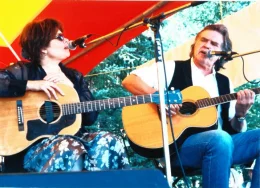
Grover Anderson
The Frontman
GroverAnderson.com
As I write, The Frontman is playing in my office, rain cascading down the window panes as a gray, spring storm holds steady. I am surrounded by the sounds of a school building slowly coming back to life, but the intensity of the recording holds me from tasks this early morning.
I take a few moments and allow myself to vicariously walk a Northern California path…
Grover Anderson—the frontman of the second-biggest band in his Sierra Nevada hometown—has captured his hopes and dreams within this rather concise album. Eight songs, no filler. Americana, country-folk if one requires labels.
First off, I love Anderson’s voice. The album has a great feel, in that Mark Erelli/Peter Mulvey pocket that too few can attain. While an independent project, there is nothing selling The Frontman short. If one didn’t know better, one could easily hear this music being identified on the radio as the latest from Josh Ritter, and I believe all involved would be okay with that.
While it has moments of stripped-down clarity, The Frontman equally has its share of elaborate, multi-layered arrangements.
I’m not going to suggest Anderson has given up on us as a species—not that I would blame him—but the opening lines to The Frontman are fairly grim, even considering they are sung moving on from a failed relationship.
One day the ocean
is going to rise up and drown everybody in New York and California;
One day the Left and the Right are going to start another civil war.
One day the sun is going to increase in size until it swallows the earth,
So what is the good in worrying about her.
“The Good” is Anderson’s litany illustrating the folly of “trying to change a woman’s mind,” fully accepting that one’s heartache is rather insignificant when considered within the immensity of time. “Archives” is similarly strong, a pensive examination of what occurs when faced with reality.
Some songs, such as “Standing Water,” are likely to simply floor the listener: absolutely devastating with brutal honesty, a radio-friendly jam to outgrowing the familiar—“Go, go! There is nothing for you in this town; You’ve seen all there is to see. I want you to stay, stay and you’d love to stick around; I can’t let you burn out here with me.” “Parallel” explores similar territory, the geometry and destiny of relationships. As did “Parallel,” “Evergreen” appeared on Anderson’s previous acoustic release, From the Pink Room. While those renditions are satisfying, the presentation here is more so, full-bodied and realized.
“On Comfort” takes a different tract from the majority of the album. Leaving aside matters of introspective personal relations, “On Comfort” cuts to the quick. Like Mark Erelli’s Americana Song of the Year-nominated “By Degrees,” “On Comfort” confronts America’s inability (unwillingness?) to deal with gun violence compounded by the reality of racism. Entirely different than Erelli’s masterpiece, but with similar intent.
Like Erelli and East Tennessee’s Jay Clark, Anderson utilizes nature to provide foundation for his music. “Evergreen” intimately juxtaposes the natural beauty of the wilderness with that of a relationship. “Wasps” sets aside daily responsibilities—“the basement’s fit to flood”—for the more important joys to be found with a Jeep, the dog, a dirt road, and “a rock beside the river.” “As long as we can see the stars, we’re gonna make it.”
The song “The Frontman” has its moments of self-deprecation, but is more than that- a paean to the working artists who hasn’t broken through- hometown heroes, all. My favourite line is- naturally- a Creedence Clearwater Revisited reference: as I listened for the first time, and Anderson sang—reflecting on a successful touring season—“Opened up for a…” I am thinking “Is he going there?” and he doesn’t disappoint! Every line of this song hits—packing up the merch, the unsolicited advice, the gigs that pay more in alcohol than cash—and I only watch the struggling musicians within my circle from a distance. Can’t imagine living the life.
The Lampoliers, Anderson’s touring group, provide the majority of the instrumentation: Marshall Henry (guitars, organ), Anthony Delaney (bass), and Josh Certo (drums). Members of the Risky Biscuits provide select support (perhaps they are the biggest band in town?) as does Jimbo Scott and Joshua Swank, whose cello adds atmospheric depth to “The Archives.” The Frontman is a textured album, one where the instrumentation is as important as the lyrics. Yes, it has a singer-songwriter base, but Anderson and his compatriots have created a vibrant musical landscape with these songs, each individual but coalescing into a unified whole. There are stories here, ones that will draw in listeners, but melody is what makes them songs—Anderson walks that fine line, ensuring he doesn’t allow his internal dialogue to interfere with the listener’s purpose: musical enjoyment.
The Frontman is why Fervor Coulee continues to exist. Take a moment to explore this album, and find your own connections within Grover Anderson’s songs. Then buy it from your favourite retailer.
No forks hitting plates.
